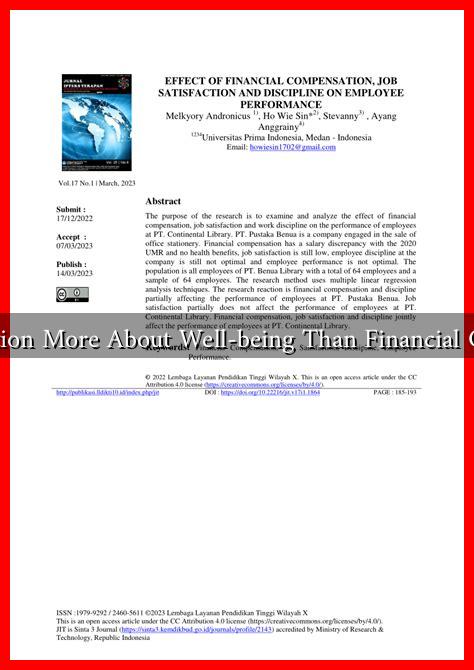-
Table of Contents
- Is Job Satisfaction More About Well-being Than Financial Compensation?
- The Traditional View: Financial Compensation as a Key Driver
- The Shift Towards Well-being
- Case Studies: Companies Prioritizing Well-being
- The Role of Leadership in Fostering Well-being
- Conclusion: A Holistic Approach to Job Satisfaction
Is Job Satisfaction More About Well-being Than Financial Compensation?
In today’s fast-paced work environment, the quest for job satisfaction has become a focal point for both employees and employers. While financial compensation has traditionally been viewed as a primary driver of job satisfaction, emerging research suggests that well-being may play a more significant role. This article explores the intricate relationship between job satisfaction, financial compensation, and overall well-being.
The Traditional View: Financial Compensation as a Key Driver
For decades, financial compensation has been considered the cornerstone of job satisfaction. Employees often equate higher salaries with greater job satisfaction, believing that financial rewards lead to a better quality of life. However, this perspective is increasingly being challenged by studies that highlight the importance of well-being.
- Salary and Job Satisfaction: According to a study by the Gallup Organization, while higher salaries can lead to increased job satisfaction, the correlation diminishes after a certain income threshold is reached.
- Maslow’s Hierarchy of Needs: Financial compensation addresses only the basic needs in Maslow’s hierarchy. Once these needs are met, factors such as belonging, esteem, and self-actualization become more critical.
The Shift Towards Well-being
Recent research indicates that well-being encompasses a broader range of factors that contribute to job satisfaction. Well-being includes emotional, psychological, and social dimensions that go beyond mere financial rewards.
- Work-Life Balance: Employees increasingly value flexibility and work-life balance. A study by the Wellness Council of America found that organizations offering flexible work arrangements report higher employee satisfaction and retention rates.
- Job Engagement: Engaged employees are more likely to be satisfied with their jobs. According to Gallup, companies with high employee engagement levels see a 21% increase in profitability.
- Positive Work Environment: A supportive and positive workplace culture fosters well-being. Employees who feel valued and appreciated are more likely to report higher job satisfaction.
Case Studies: Companies Prioritizing Well-being
Several companies have successfully implemented well-being initiatives that have led to increased job satisfaction among their employees.
- Google: Known for its employee-centric policies, Google offers various wellness programs, including mental health resources and fitness classes. This focus on well-being has contributed to its reputation as one of the best places to work.
- Salesforce: Salesforce has invested heavily in employee well-being, providing mental health days and wellness reimbursement programs. As a result, the company has seen a significant increase in employee satisfaction and retention.
The Role of Leadership in Fostering Well-being
Leadership plays a crucial role in promoting a culture of well-being within organizations. Leaders who prioritize employee well-being can create an environment where job satisfaction flourishes.
- Open Communication: Leaders should encourage open dialogue about well-being and job satisfaction, allowing employees to voice their concerns and suggestions.
- Recognition and Appreciation: Regularly recognizing and appreciating employees’ contributions can enhance their sense of belonging and job satisfaction.
- Professional Development: Providing opportunities for growth and development can lead to increased job satisfaction, as employees feel valued and invested in.
Conclusion: A Holistic Approach to Job Satisfaction
While financial compensation remains an important factor in job satisfaction, it is clear that well-being plays a more significant role in fostering a fulfilling work experience. Organizations that prioritize employee well-being through flexible work arrangements, positive workplace culture, and supportive leadership are likely to see higher levels of job satisfaction and retention.
In summary, the future of job satisfaction lies in a holistic approach that values both financial compensation and the overall well-being of employees. By recognizing the importance of well-being, companies can create a more engaged, satisfied, and productive workforce.

